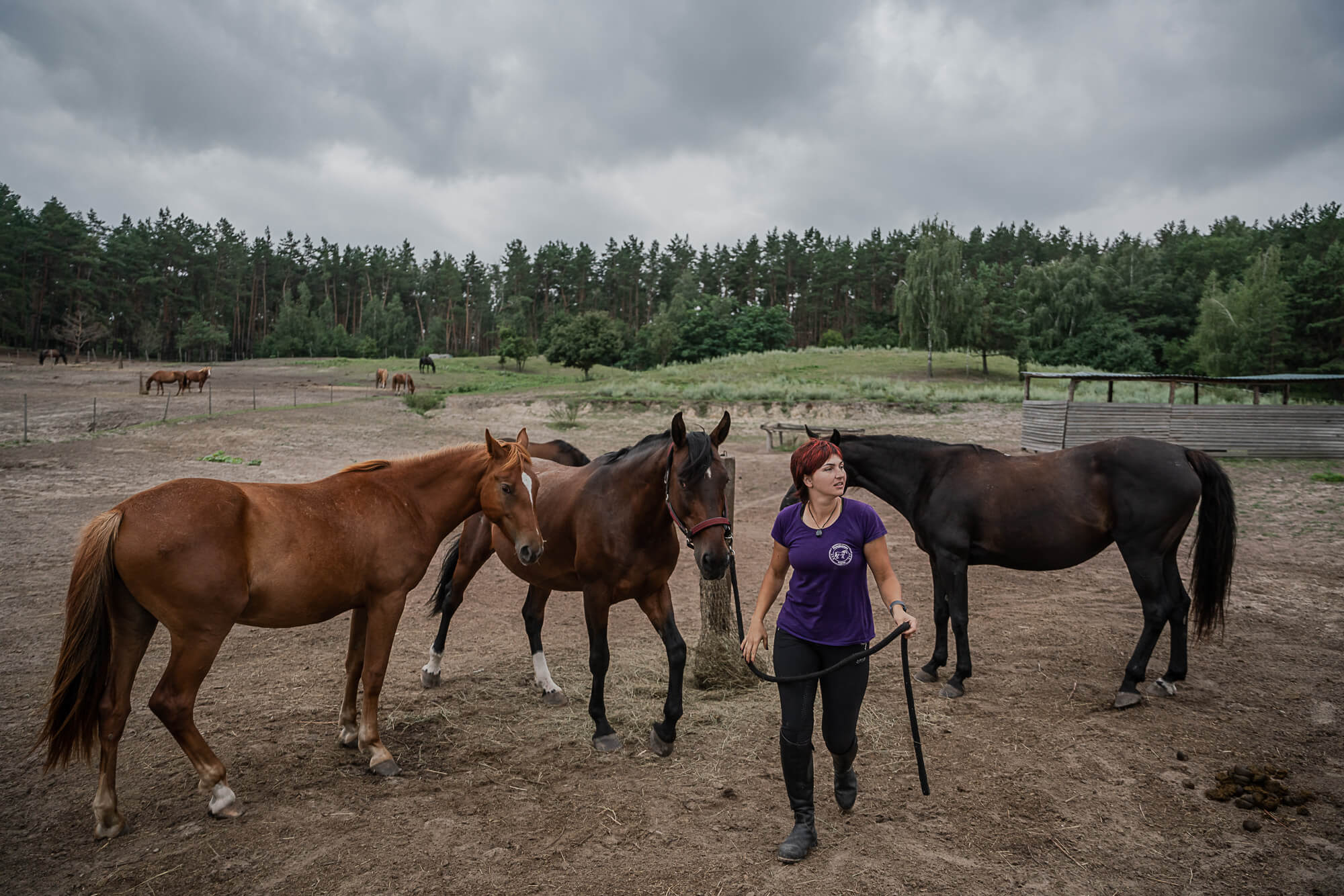
Sacred ground
Lakritz didn’t suffer—he died almost instantly. On the morning of February 25, a Russian shell exploded in the ranch’s yard: shrapnel scattered everywhere, hitting an innocent animal. The 15-year-old chestnut-colored horse exhaled its last breath loudly and collapsed for the last time.
Solomakhyno Ranch in Lytvynivka, Kyiv region, was occupied for more than 30 days. Along with the herd of horses, the groomers remained on the ranch during the occupation, and in the first few weeks, so did the two trainers. Despite daily shelling, the lack of electricity and water, people took care of 52 horses, day in and day out: they started the generator, carried water from the well in buckets with frozen hands, and stretched the food supplies as much as they could. In the most terrifying times, the horses repaid the people for their care with the warmth of their bodies. Later, the residents of Lytvynivka started saying that Solomakhyno Ranch was a sacred ground.
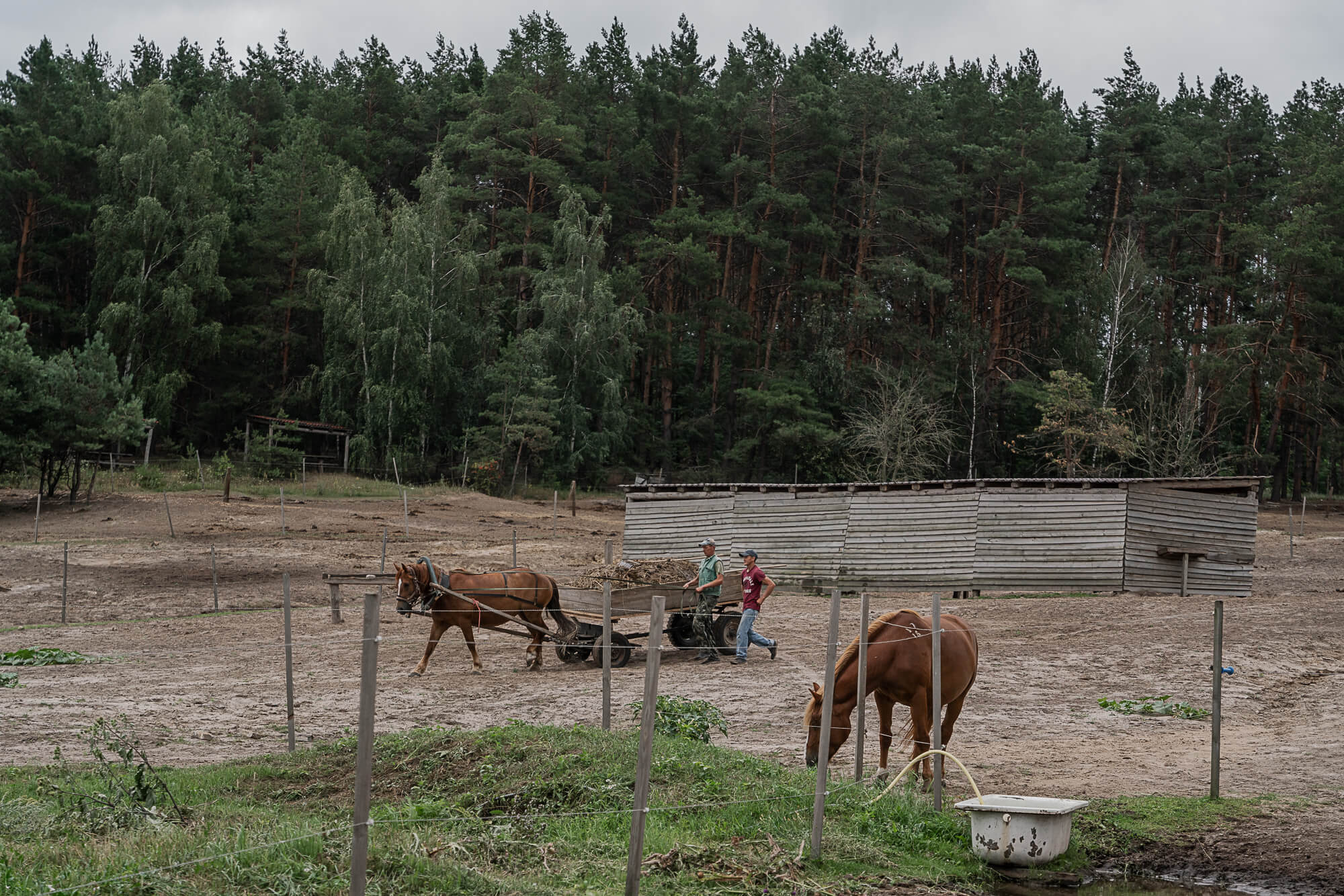
Vika and Baby
“Go, go, go!” a woman shouts clearly, cupping both hands around her mouth. Wearing a purple T-shirt and black sweatpants tucked into high riding boots, she stands on a winding road between a pine forest, stables, and a large open field surrounded by a wooden fence, where about a dozen horses of various breeds graze.
“Where are you going, rascals? There’s nothing to hunt there,” the woman smiles and waves her index finger in front of the four greyhounds that run toward her on command.
Cobra, Nayma, Panda, and Cherry—better known as Devil—graceful and fit English greyhounds, stop like a well-oiled machine, perk up their ears simultaneously, and immediately run toward the stables.
34-year-old Viktoriia Davydenko has been running Solomakhyno Ranch in the village of Lytvynivka for several years. A veterinarian and a professional athlete, Viktoriia, along with grooms, a horse breeder, and her trainer colleagues, take care of about fifty horses and mares of various breeds on two hectares of land. Most of the animals that live here are privately owned, but some ended up at the ranch through misfortune—after the start of the full-scale Russian invasion, Vika began to rescue horses from the occupied and frontline regions.
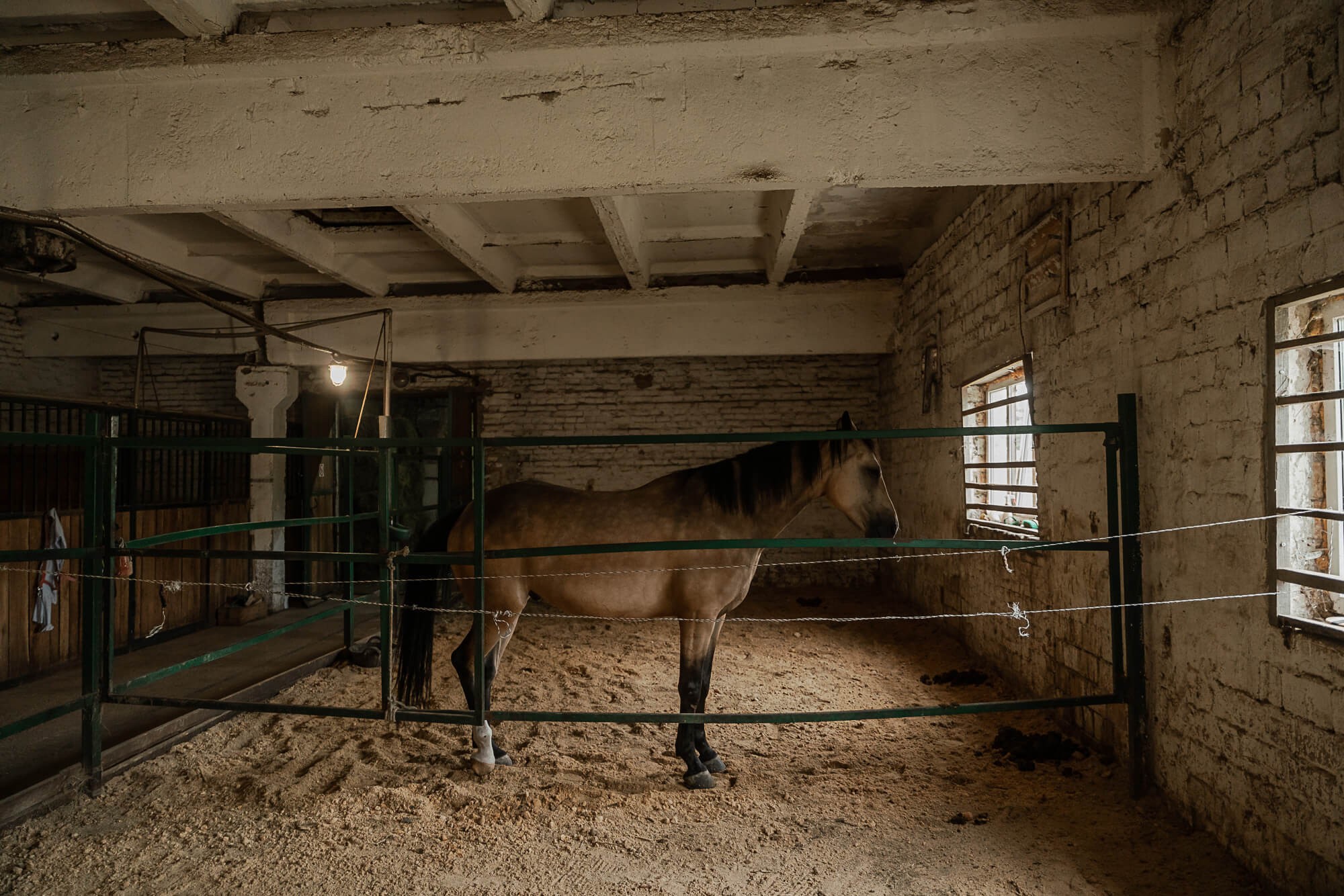
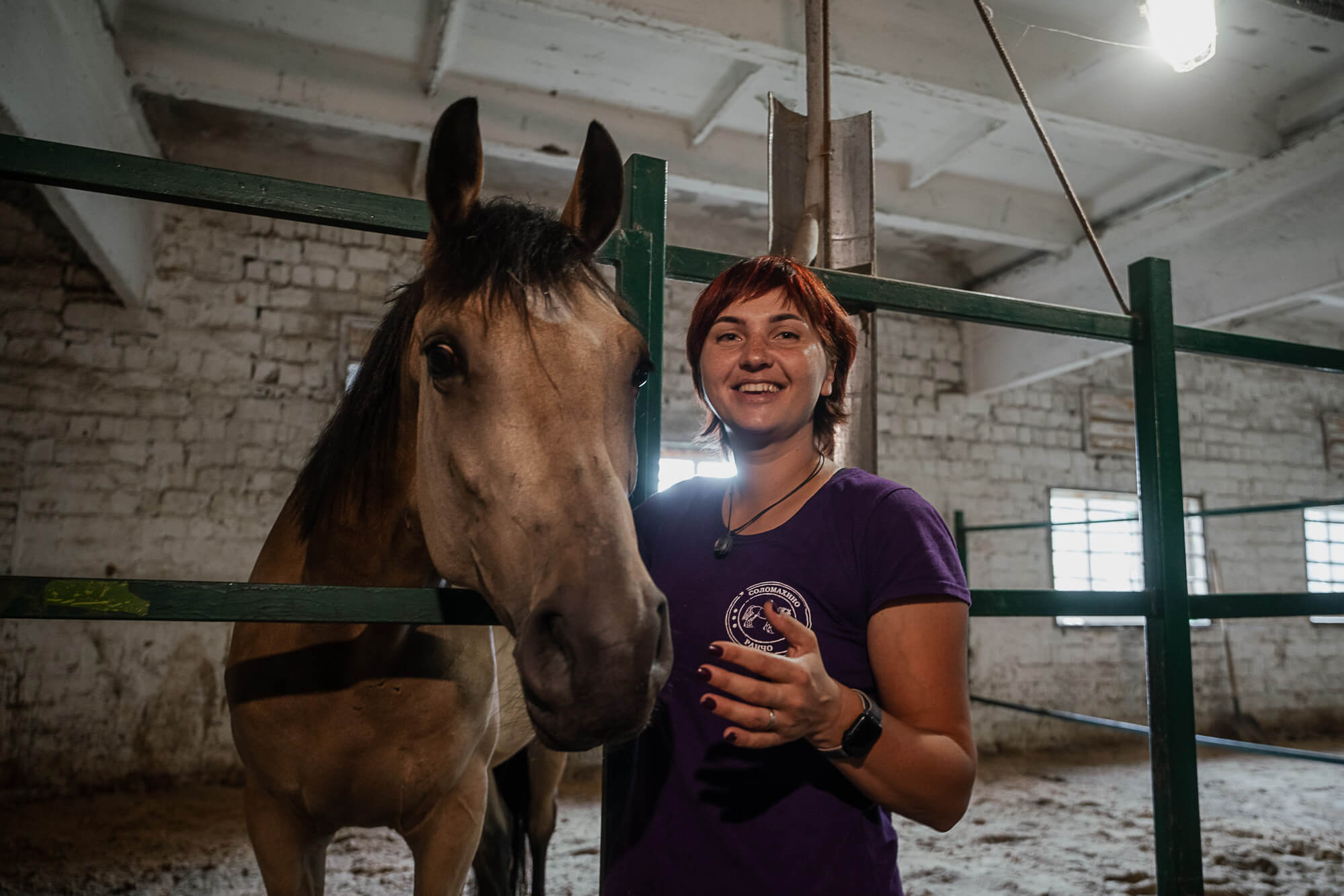
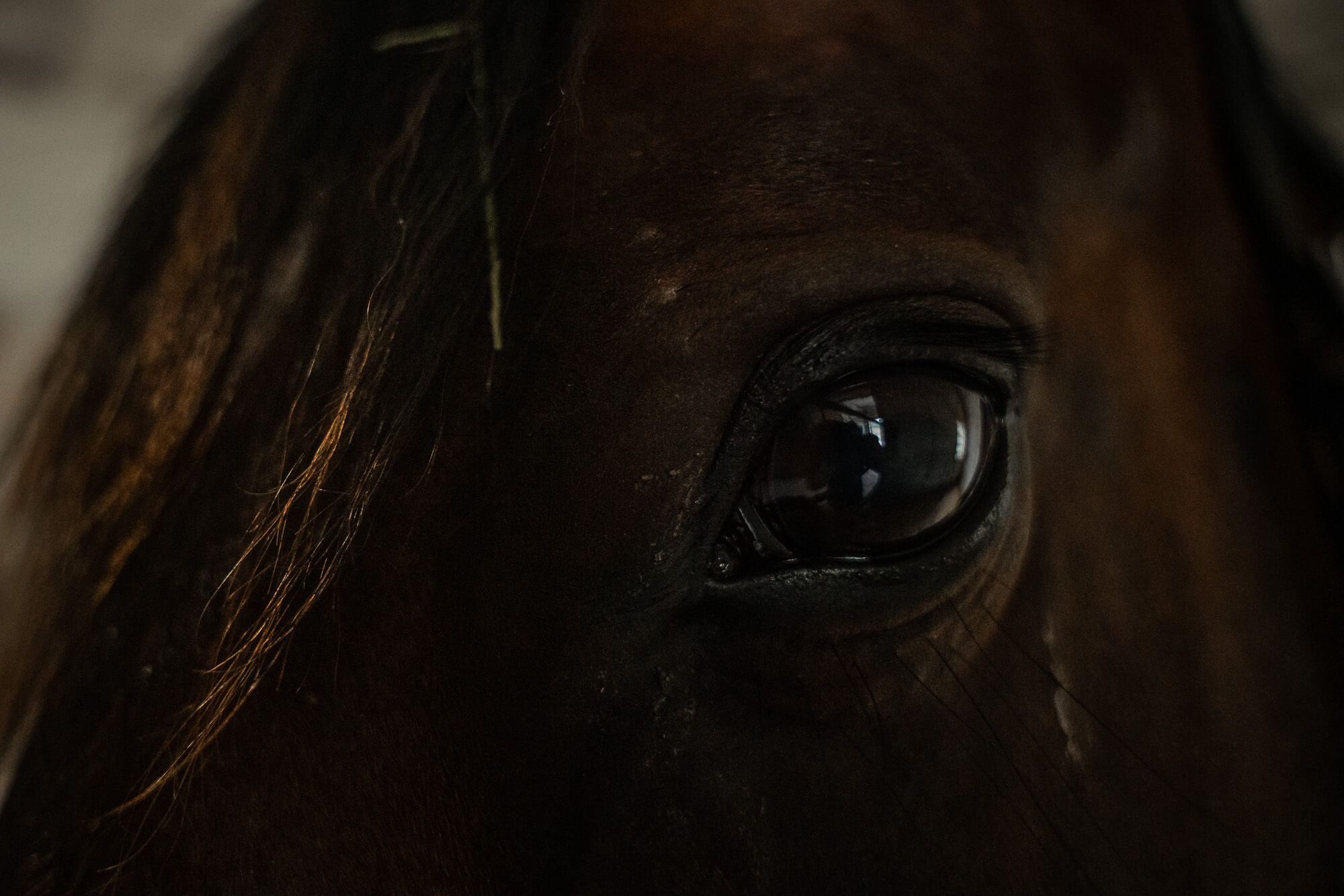
“The one with the white mane, do you see it?” She points to a low but strong mare. “This breed is called Novooleksandrivskyi Vahovoz. They bred them in the Luhansk region in the village with the same name, which is now occupied. We saved this mare and decided to give her to the Dibrivsky horse farm in Poltava.”
Vika enthusiastically shows the ranch yard, the recently installed automatic horse waterers, and the huge pasture behind a low wooden fence. Together with the four greyhounds, she goes into the bright and spacious stables—stops near bundles of fragrant hay and immediately becomes serious—she says that in Ukraine not all horses have these living conditions, unfortunately.
“Come inside with me, yes, yes,” Vika leads us with a photographer colleague inside the stable. “What do you think?” She asks. “How do you feel? Comfortable?”
“Terrible,” I answer, realizing how narrow and dark it is inside.
“That’s right!” she raises her voice. “It’s essentially a prison cell!”
—Two adults can barely fit in here. And the horse would be in this stable all the time, almost around the clock. It would eat, go to the bathroom, drink water—all right here. Horrible! We have moved away from this a long time ago and teach people to be responsible horse owners.”
Vika’s love for animals was instilled by her mother, who passed away when the future veterinarian was only four years old. Her mother left behind, among other things, a dog, which later taught Vika both dedication and responsibility.
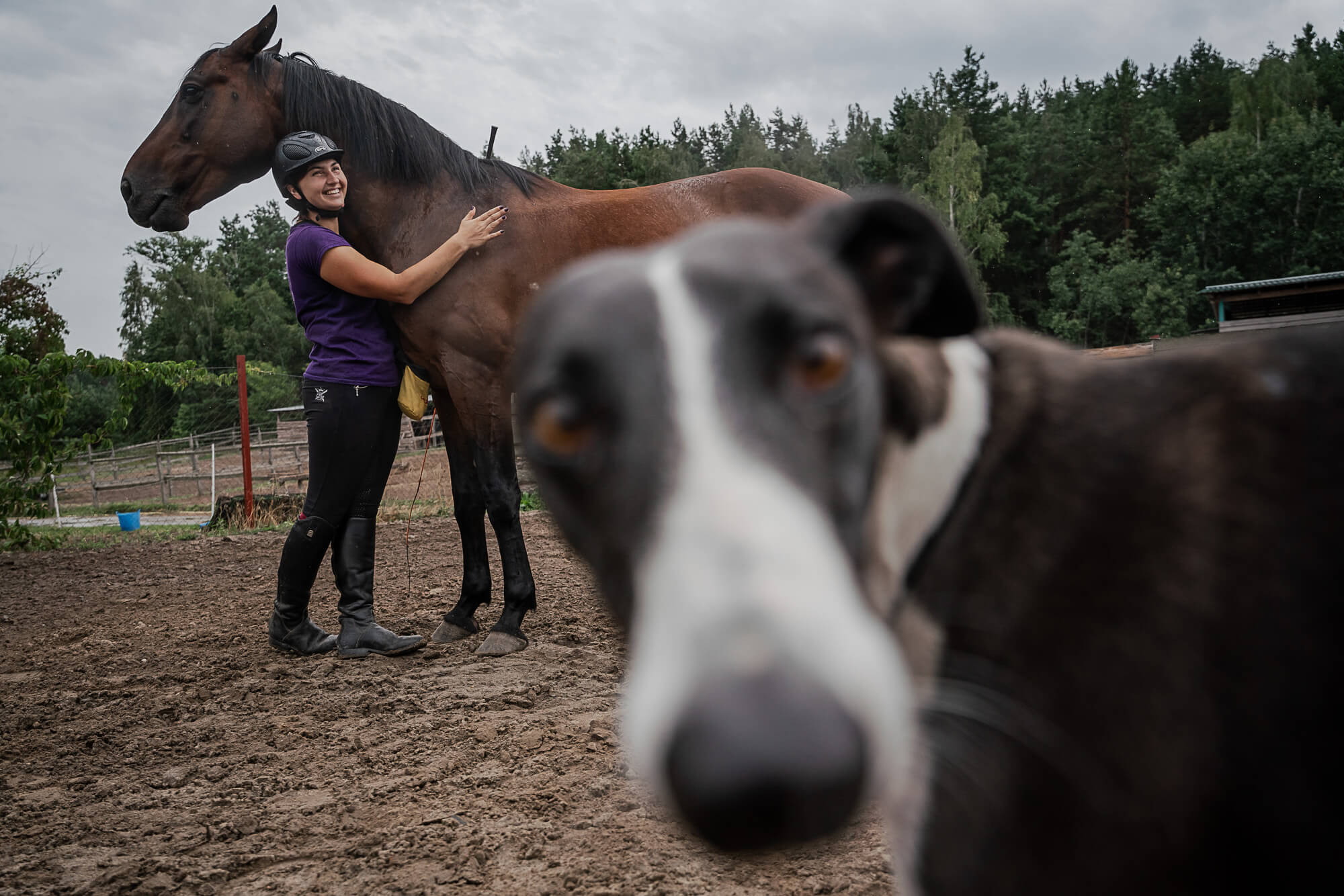
As a schoolgirl, Vika was not just close with four-legged friends but became interested in ethology—the study of animal behavior. She says she looked for specialized books both in Ukraine and abroad. She asked for them as birthday presents so that she could stay up all night and learn all the little details of this field of zoology. At the same time, Vika also started participating in show jumping, a sport that involves overcoming obstacles on horseback.
When it was time to choose a profession, the brilliant horse rider quickly decided that she would dedicate her life to animals. And preferably to horses. But she immediately faced a challenge—it turned out that in her native Kremenchuk, as well as in the whole Poltava region, there were no higher educational institutions specializing in this.
A minor by age, but mature in her ambitions, Vika left home to enroll in the Kharkiv State Veterinary Academy, where she could combine studying to become a veterinarian and show jumping—since the academy had a large horse farm. As a young woman, she showed great promise in riding, but during training, she cringed every time she saw people forcing horses to follow orders.
“At the academy, I realized that animals cannot be treated like sports equipment. They are alive and feel everything,” Vika explains while combing a black and brown horse with a special brush.
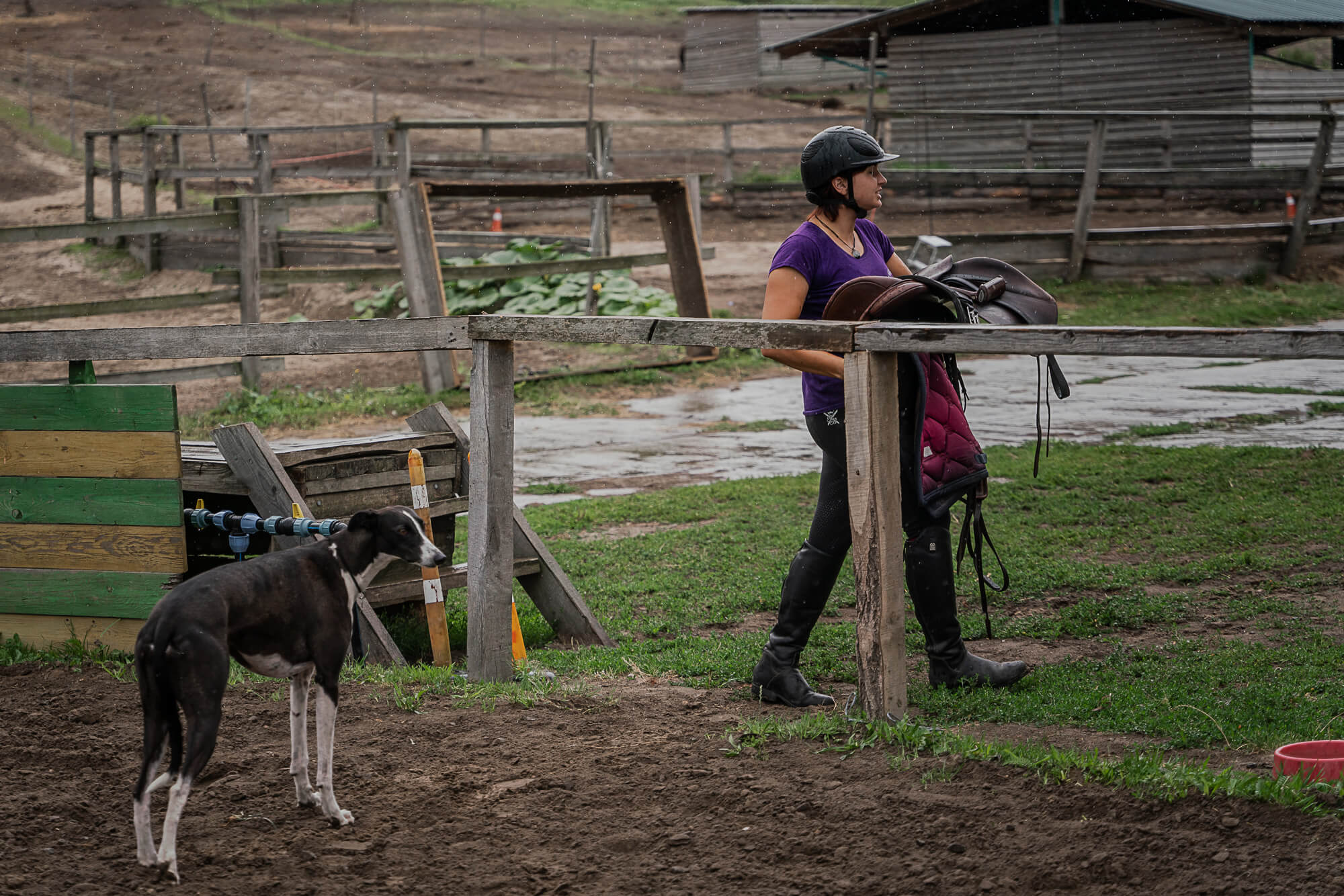
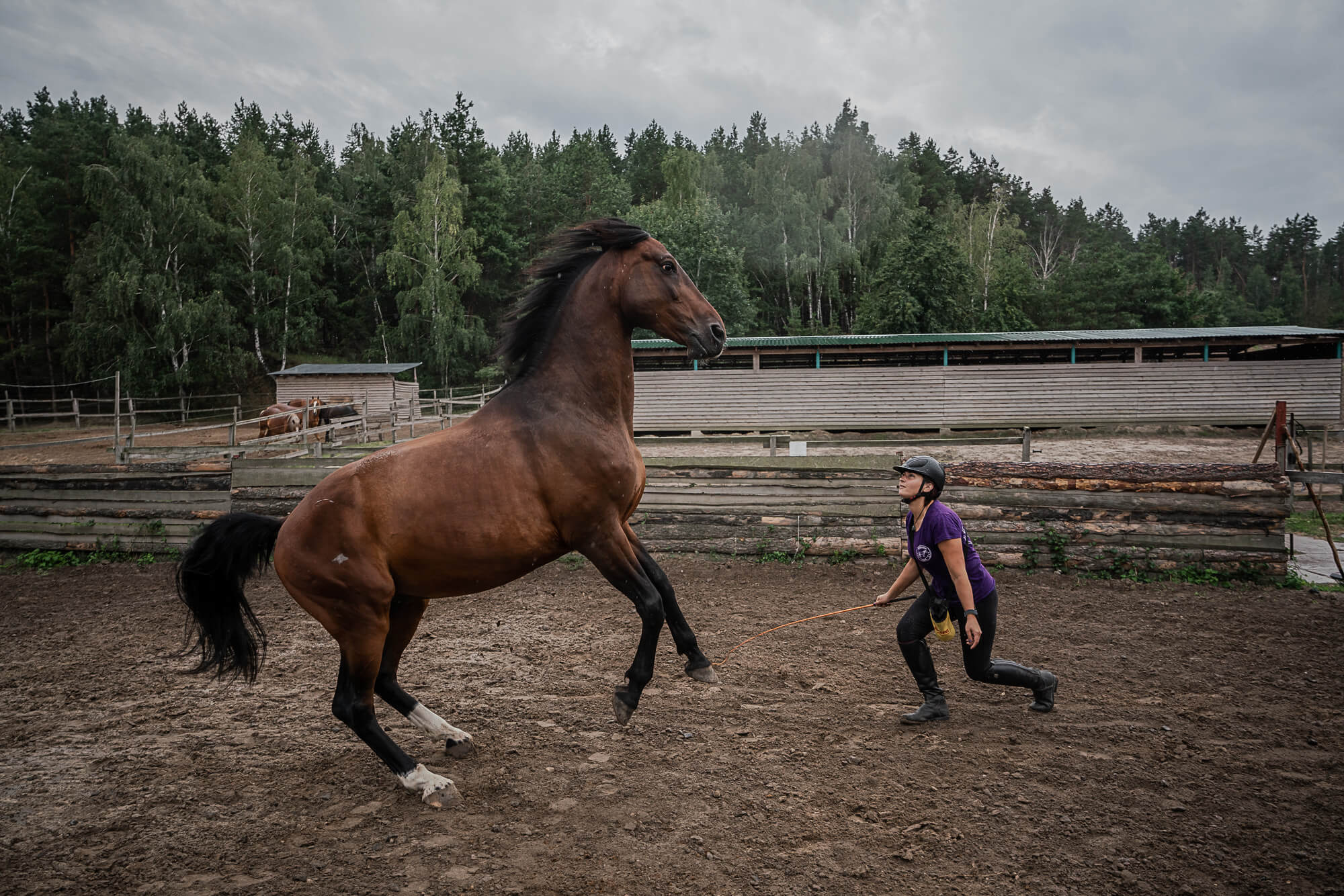
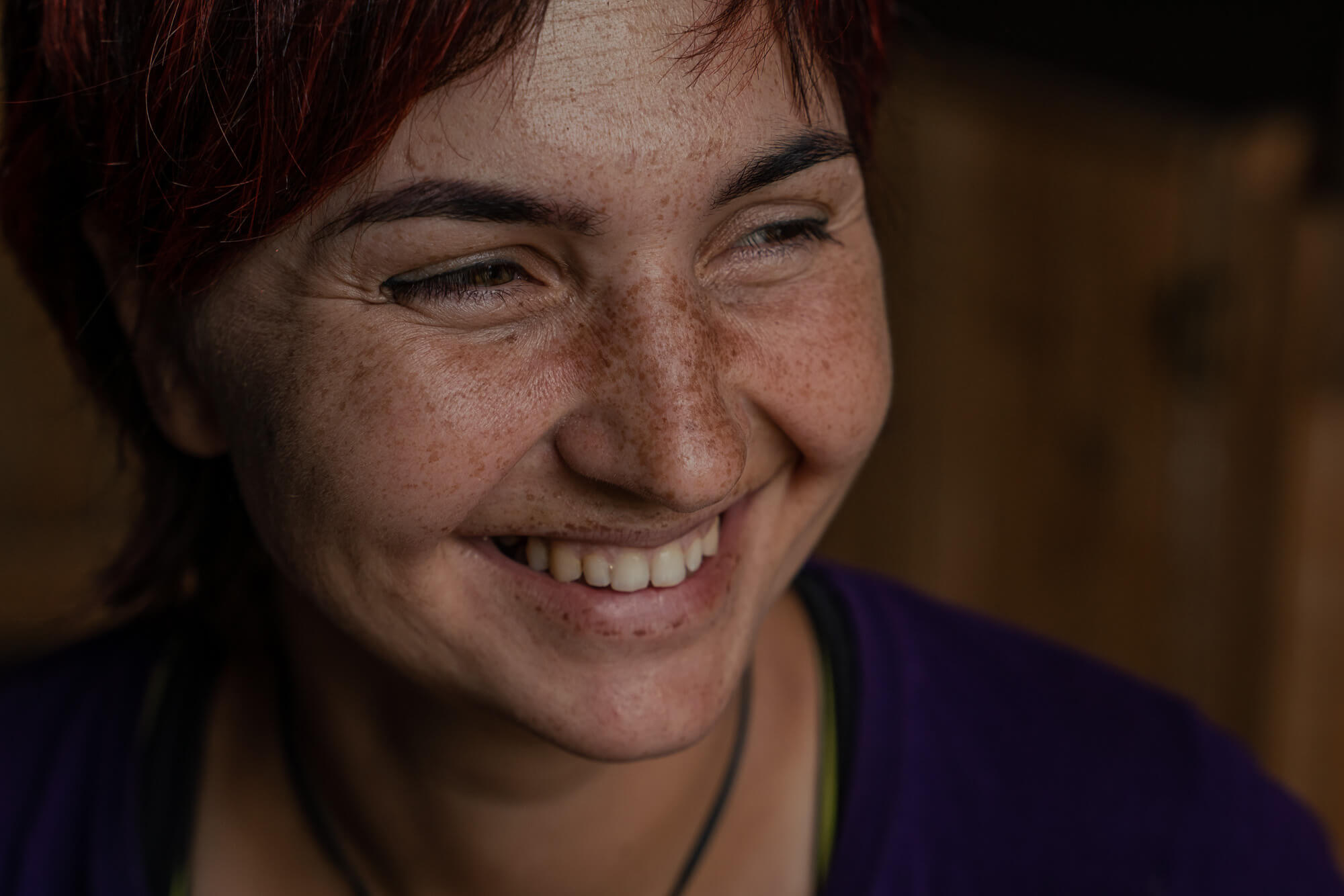
She began sharing her approach with the teachers who had taught her show jumping: moving away from brute force and instead trying to negotiate with the animal. And one day, probably to test Vika’s theory, one of the trainers asked her to ride the most difficult mare at the farm.
“The chestnut Ukrainian Riding Horse,” she continues, “everyone called her Chicken—was very unpleasant. Biting, angry, seemingly incorrigible. We spend most of our time taking care of the horses, and, I remember, one time I was cleaning her stall and as soon as I would gather everything, she would kick the bucket over with her hoof. I would approach her and she would snap her teeth and grab my sleeve. She was stubborn. Well, I was stubborn too—I thought: alright, alright, I’ll find a way to win you over.”
After several weeks of trying to ride the chestnut horse, Vika accidentally found out that the mare’s name was Baby, and from then on she stopped, like everyone else, insultingly calling her Chicken. Day after day she tried to find the right approach with Baby, but the horse kept biting and kicking over the wheelbarrow. In the end, stubbornness, along with the approach of “more attention to the animal, less sport, and less stress”, gave their result.
“As soon as they stopped treating the mare as sports equipment,” Vika explains, “the horse stopped biting and began to follow commands more skillfully than others. Without yelling or screaming, Baby would lie down and even sit on command. With time, I removed all of the equipment from her and continued to perform all the complex tricks in the ‘bare’ state. When the mare would get tired, or simply didn’t want to do something, I did not force her—after all, with horses, like with people, you need to feel them out.
“People with horses in their hearts”
The whole time we’re talking with Vika, in addition to the English greyhounds, her 4-year-old son, Timur, is beside her.
All the time, while we talk with Vika, her 4-year-old son, Timur, curls up next to her, in addition to English greyhounds. Restless and curious, he constantly tries to get in front of the camera, jumps from haystack to haystack, fearlessly runs between horses, and laughs loudly every time someone pays attention to him.
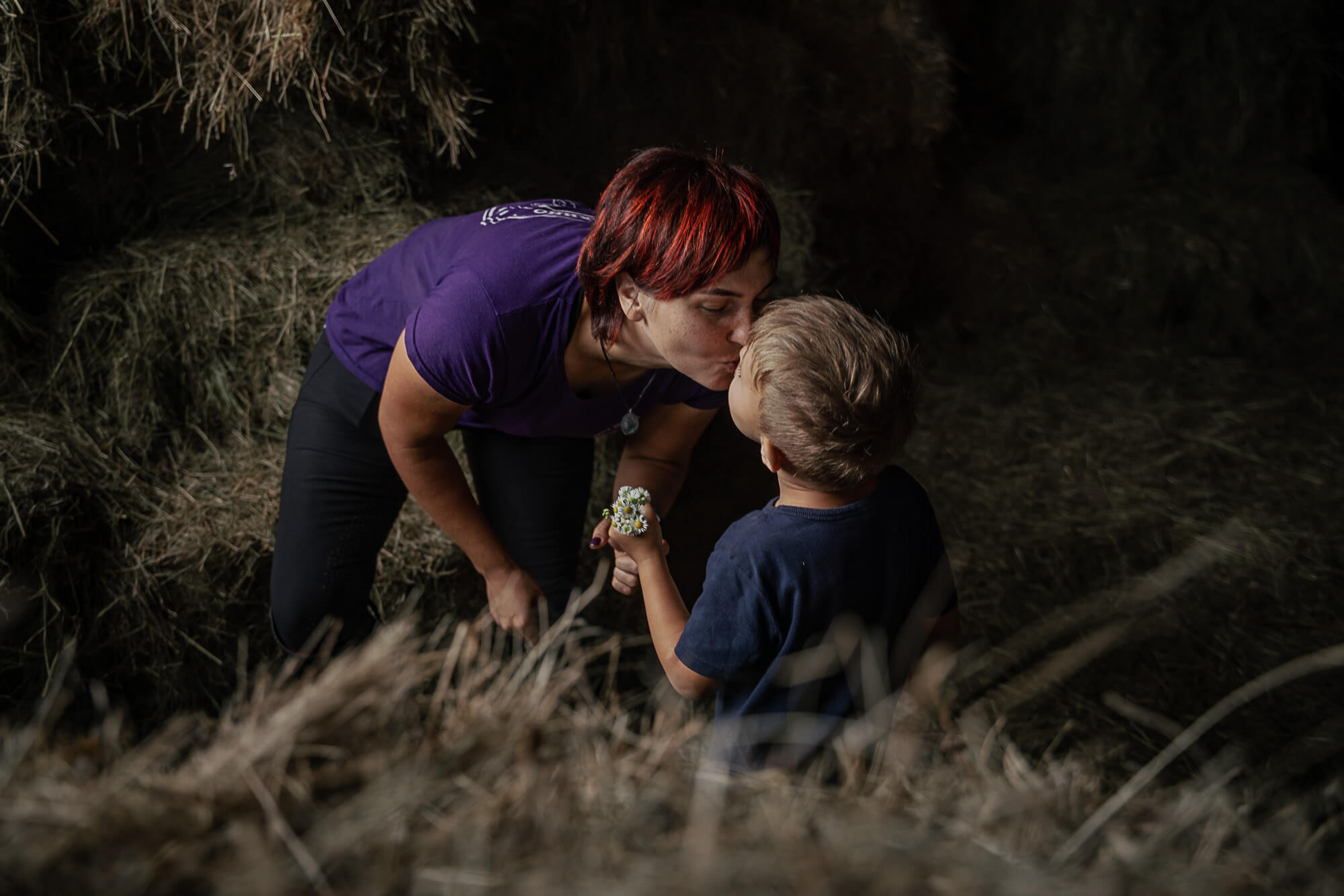
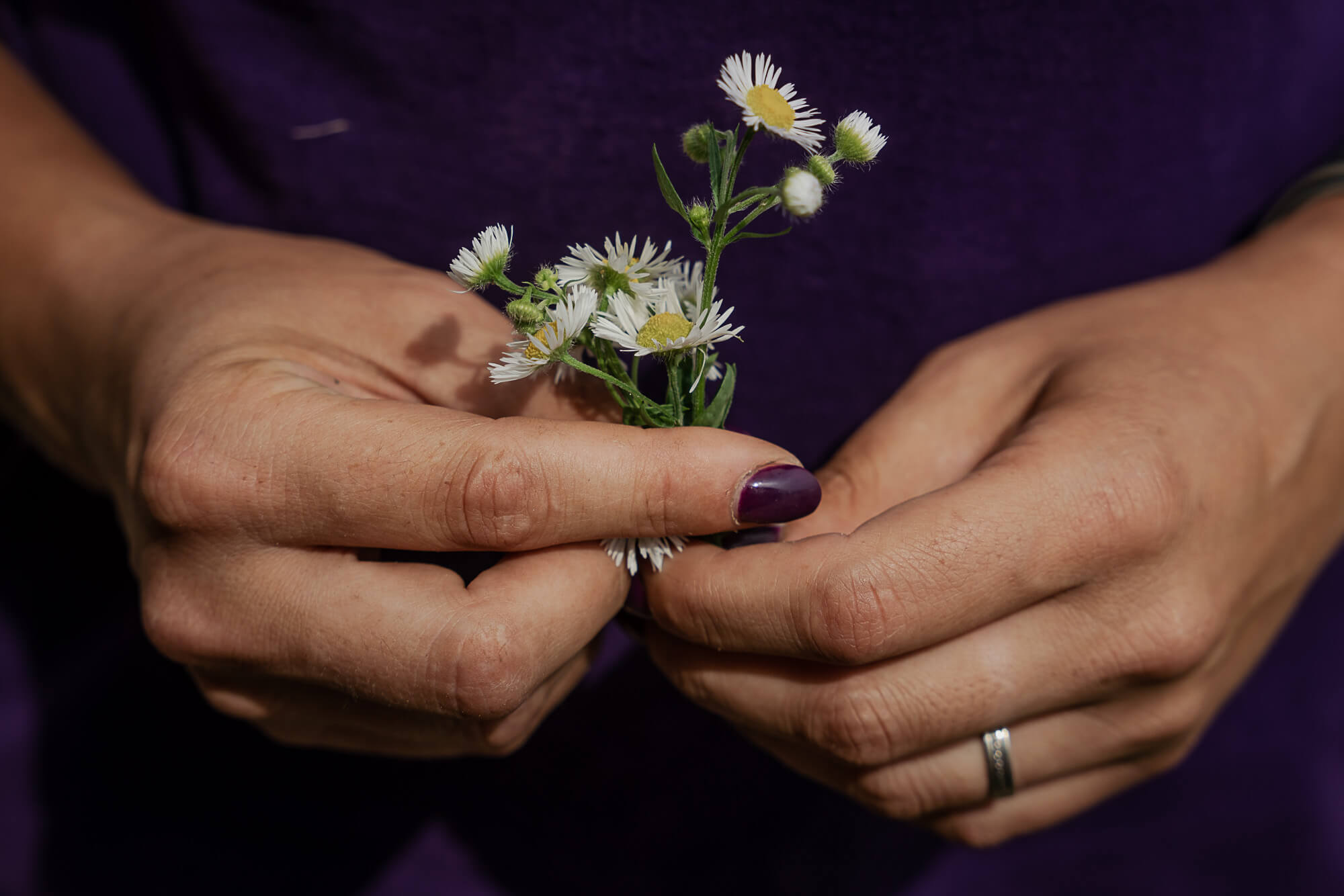
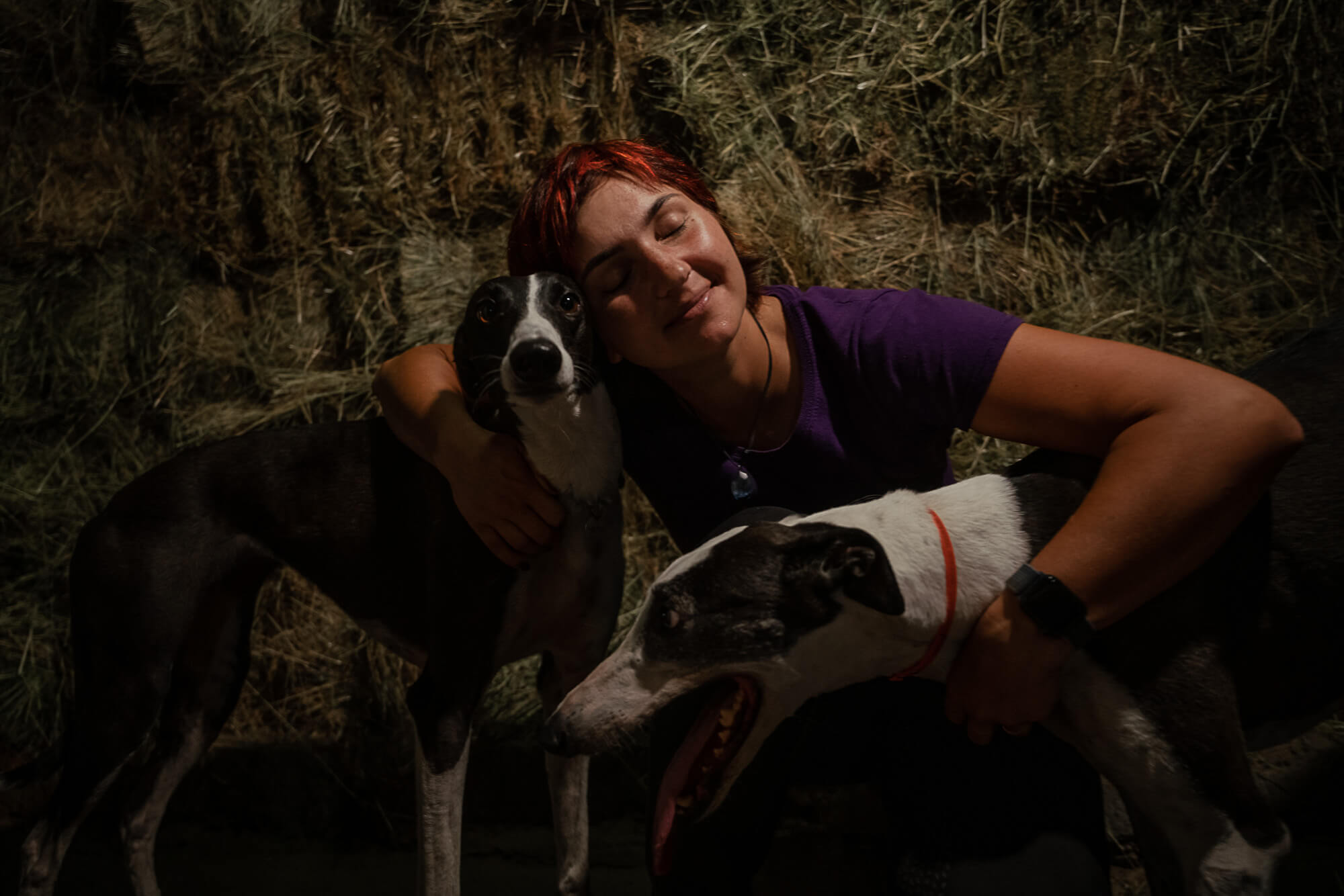
“If it weren’t for this little one,” the woman sighs, “I think we wouldn’t have gone anywhere last year. Only Timur keeps me from the front line: if it weren’t for motherhood, I would definitely be somewhere in the trenches: I’m not afraid of blood, I’m a doctor, I know how to stitch.”
During the first few weeks of the Russian occupation of Kyiv region, Vika, her husband Maksym, who now serves in the Armed Forces of Ukraine, and their three-year-old son Timur stayed in Lytvynivka. Right outside the fence of their house, enemy military equipment was accumulating. The Russians walked through the streets of the village as if they were at home, and Vika, gritting her teeth, passed them while walking to the ranch. From the end of February until the beginning of March, the woman and her colleague Nataliia were the only trainers left at Solomakhyno Ranch.
“What kept me going was the belief that this won’t last long, and our army will soon liberate Kyiv region. I felt responsible for the animals, and at the time I was also treating a very sick mare on the ranch. On February 24, we were supposed to receive antibiotics for her, but on the first day of the invasion, the post office in neighboring Havrylivka was closed. There was a shortage of medicine, and the mare later died of sepsis. We consulted her owner, and made the painful decision to let her go.”
The mare had to be put down, and before that, Lakritz, the horse that got killed by a Russian shell, were handed over to the 12 Months Zoo, also in Kyiv region. During the occupation, there were seven employees and two guards left in the zoo, while normally, more than 50 people took care of over 300 animals. The Hippo could have died from the cold, but people always found fuel for the generator to keep him warm. Moreover, other animals, including the horses, were at risk of dying, but they were saved. Or more precisely, people who were painfully aware of everything that was happening around them, decided that they had to do something to help.
“At night, when the shelling intensified, we hid in our basement with my husband, son, and the family of my husband’s brother, who came to us from Bucha. I remember how in peacetime, I used to say that the basement should be demolished, but now I think, “Thank God we didn’t do that”. The basement and the well, which I never liked before, will now forever remain in our yard.”
The turning point, or, as she says, a point of no return, was not only the relentless attacks by the Russians but also the realization of her own helplessness. Before, little Timur received one candy from his mom every day, and when the supply of sweets ran out, Vika realized that she was not in control of the situation. It was unclear when Lytvynivka would be liberated, and that she would never forgive herself if something happened to her son due to her decision to stay.”
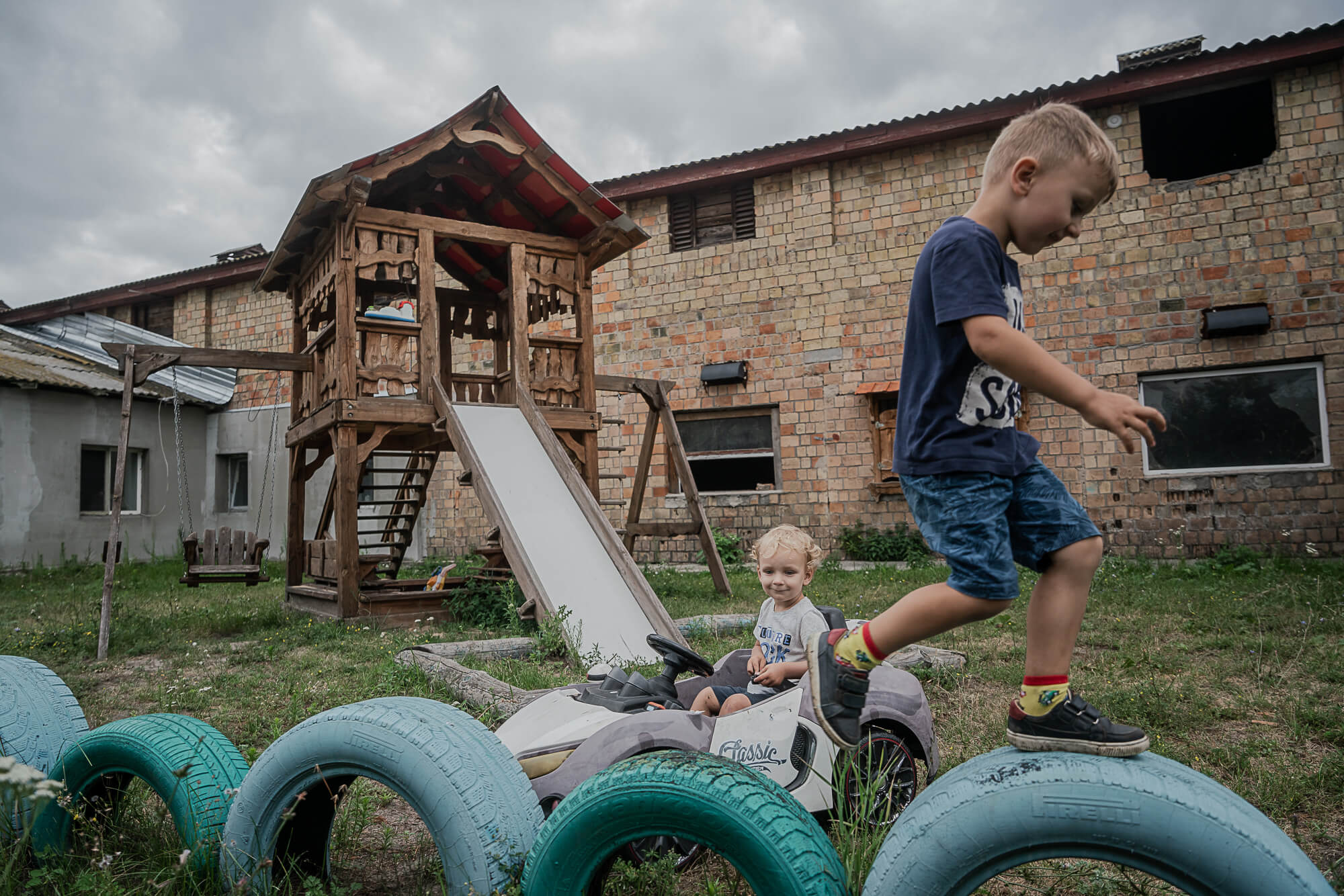
Transporting fifty horses from occupied Lytvynivka was an impossible task. The bridges near the village were already blown up, crossing the water directly or using the narrow surviving piece of the bridge was impossible.
In the first days after the full-scale invasion, Vika and her colleague Nataliia agreed to put makeshift saddles on all the horses—which would not hinder their movement but would still allow them to catch the animals.
“We considered the possibility that if another missile hit the ranch, the horses would get scared, break out of the stables, and run into the forest. No one wanted to think about the fact that no one would go after the horses if they broke free. So, we silently kept putting on the makeshift saddles, praying for everyone’s survival, for the animals to not get scared of the explosions, and for us to have a place to return to.”
With a few small backpacks, her three-year-old son, and her husband, Vika left Lytvynivka on foot. In March, the other trainer, Nataliia, left the village with her. Tolya, a soldier, and his partner Yura took care of the horses until the de-occupation, which happened a few weeks later.
The two men lived on the ranch until April 2nd. Fortunately, they had a bit of fuel to start the generator and thaw frozen water, and luckily, were able to stretch the hay supplies. Yura and Tolya were a sign for the locals that everything was fine: if the ranch was fine, why wouldn’t Lytvynivka be fine as well?
Life during the occupation was very difficult. The Russians did not enter the ranch but drove through the streets of Lytvynivka with tanks and armored vehicles, kidnapping and torturing local people. For 30 long days, battles raged around the village, and in the sky above Lytvynivka, enemy missiles, planes, and helicopters flew from Belarus towards Hostomel, Bucha, and Irpin.
“First, my husband took Timur and me to Western Ukraine, then my son and I went abroad, and Max returned home to enlist.”
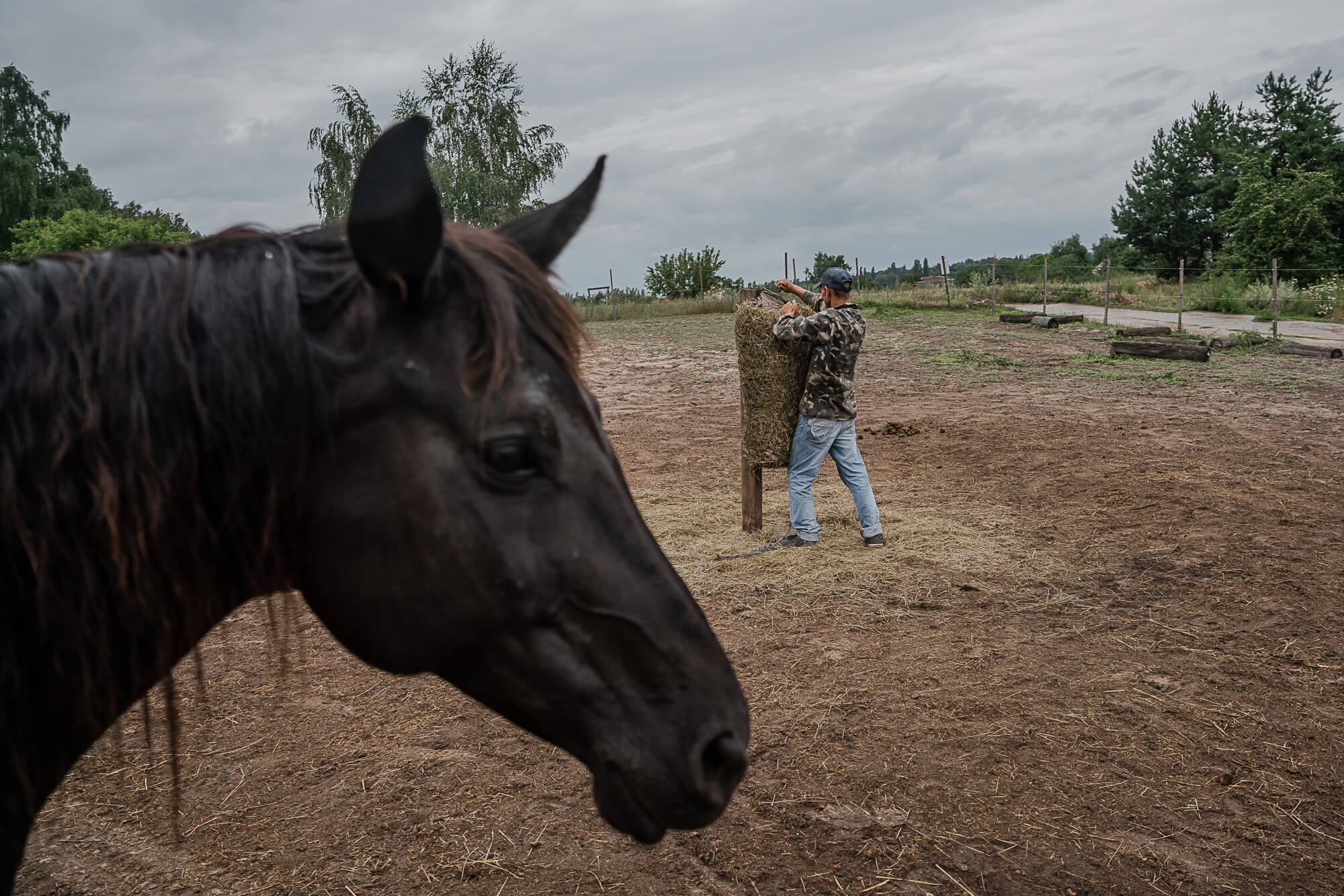
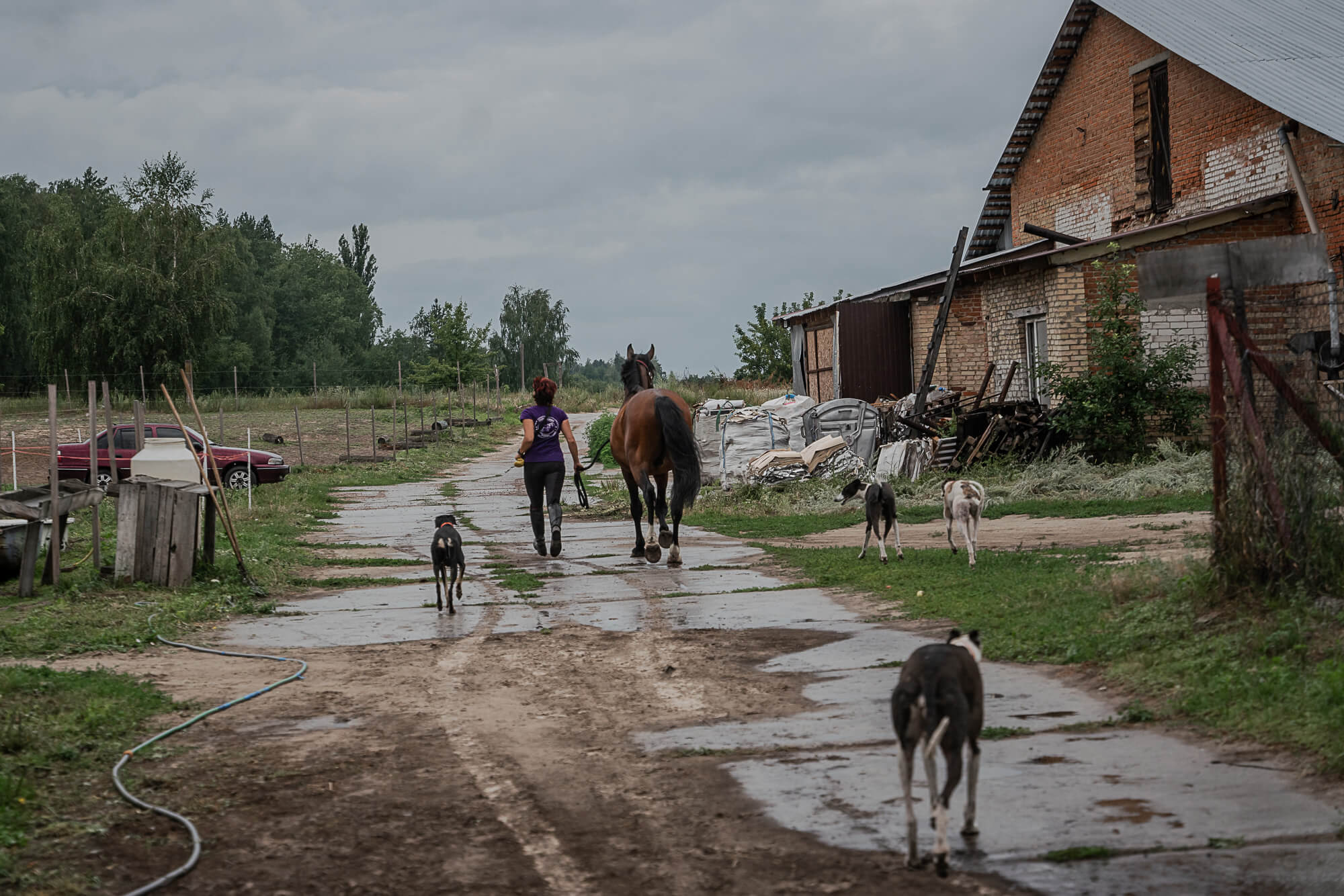
“In early April, Kyiv region was liberated, and I was barely able to stay for a few more months before going home. Friends said, “Maybe stay a little longer? What if it happens again?” But I couldn’t be anywhere else—the horses were waiting for me, and I was waiting for them.”
After her return, Vika was amazed by all the supplies that people from the village had brought to Solomakhyno Ranch. Almost everyone who evacuated and those who stayed seemed to consider it their duty to share what they had. The residents of Lytvynivka, without exception, explained, “You have a sacred place here. Standing among the horses warms in the soul, calms you down, and gives you hope for a better future”. Over a year and a half after the de-occupation of Kyiv region, I also feel an incredible energy on the ranch—pine forest, large stables, horses grazing on the green meadow, and most importantly, people who managed to remain human even in the toughest of times.
Despite the war, Vika, her colleague Nataliia, accountant Olya, who works as a trainer and calls the employees “people with horses in their hearts”, along with horse breeders and stablemen, are trying their best to develop Solomakhyno Ranch.
To educate the public about ethology, they recently launched the “School of Responsible Horse Ownership”. Current animal owners, as well as those who only dream of having their own horse, can learn the rules of handling horses, including communication, care, and riding techniques. They also offer private riding lessons, wagon rides, and horse and pony rides. During the summer, you can book a gazebo and barbecue or have a picnic. And if you want something completely unusual, you can try a special type of yoga—horse yoga.
“We are doing all of this without grants and outside investment—just with enthusiasm, great love for animals, and the help of the people who come visit us. But most importantly,” Vika admits, “I dream of developing an equine-assisted therapy program at the ranch. I want wounded soldiers to come to Solomakhyno Ranch to try this wonderful method of treating visible and invisible injuries. Our humanity manifests itself in the midst of the darkness of war. Now it is more important than ever to not lose it.”
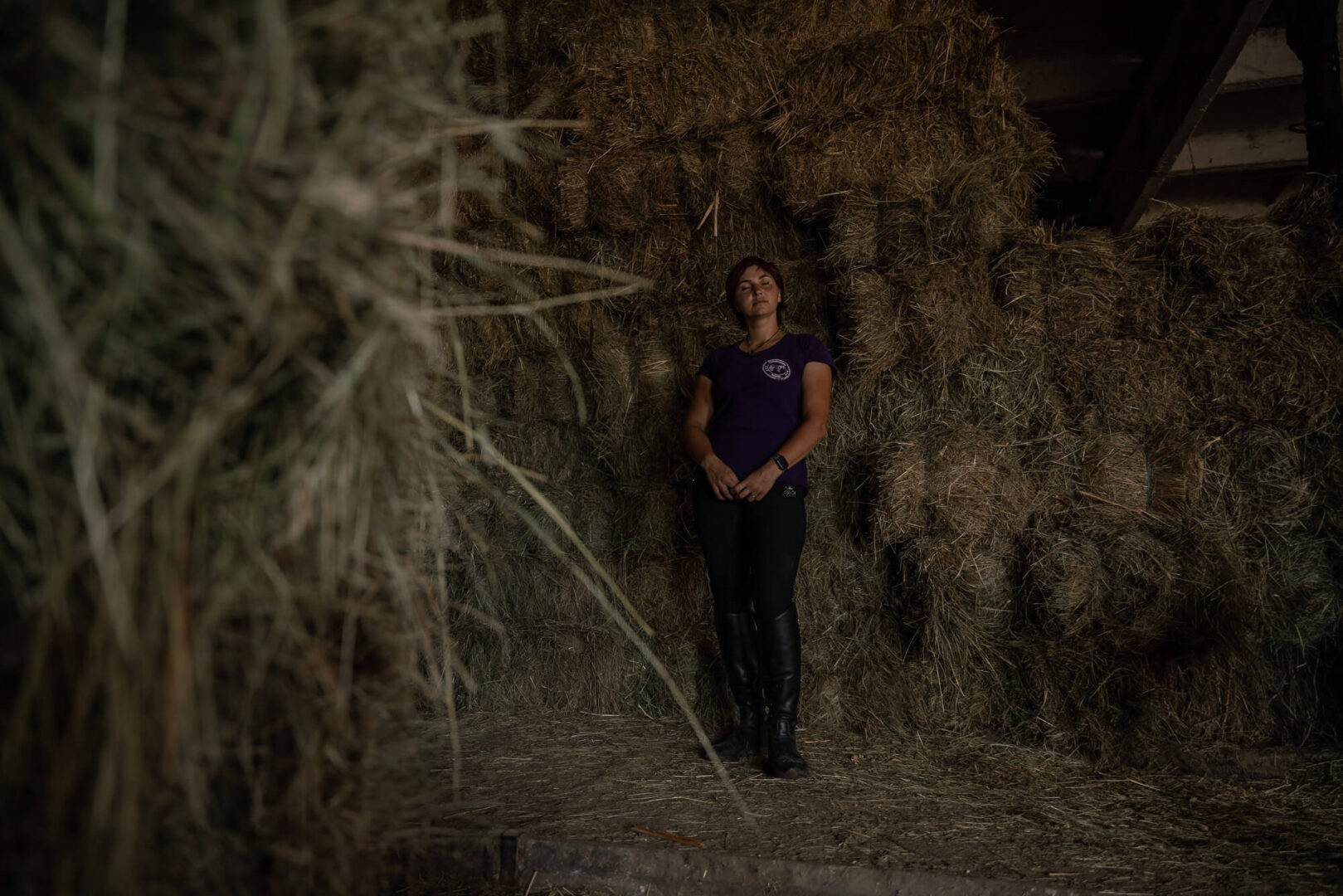
***
«Healed Lands. Зцілені землі» is part of «De-occupied: Stories of the Liberated Territories», a project supported by the Heinrich Böll Foundation’s Bureau in Kyiv, Ukraine. Its goal is to show that Ukrainians are not giving up or waiting for outside help but are bringing life back to their communities and homes. Even though the war continues.
In these texts, we report on the renewal of life in Ukrainian territories that used to be temporarily occupied or besieged by the Russian army. We publish stories based on personal experiences of war—about people who find the strength to go on living and pass that strength on to others. About people who lead by example, inspire others, or help villages and towns recover from the war through their initiatives.
Have read to the end! What's next?
Next is a small request.
Building media in Ukraine is not an easy task. It requires special experience, knowledge and special resources. Literary reportage is also one of the most expensive genres of journalism. That's why we need your support.
We have no investors or "friendly politicians" - we’ve always been independent. The only dependence we would like to have is dependence on educated and caring readers. We invite you to support us on Patreon, so we could create more valuable things with your help.
Reports130
More






